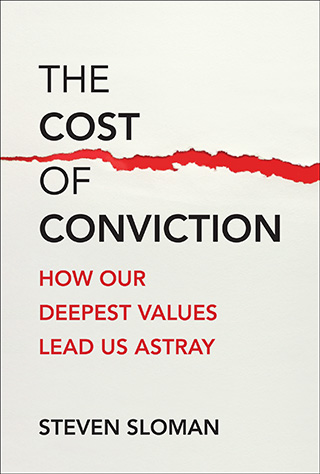Why Sacred Values Are Dangerous

Paul Jennings Hill had a sacred value: He believed that abortion was murder. Hill’s last words before being executed by lethal injection for killing physician John Britton and his bodyguard were: “If you believe abortion is a lethal force, you should oppose the force and do what you have to do to stop it. May God help you to protect the unborn as you would want to be protected.”

Sacred values may signify that one has a conscience, but they also have a dark side. They can lead to extremism and terror. They can be the foundation for an intransigence that is a root cause of many of society’s deepest and most pressing problems.
The danger of sacred values isn’t just that they can drive individuals like Paul Hill to commit acts of violence. Individual acts of malevolent extremism like Hill’s are horrifying, but mercifully rare. That’s not the direction that sacred values normally press. More commonly, sacred values operate by binding members of a community and encouraging group action. Religious communities, for example, are replete with sacred values of various kinds, including moral proscriptions, ritual acts, and belief in deities. Adherence to such values is often necessary and sometimes sufficient to be a member in good standing of a religious community. For centuries, the vast majority of Europeans were under the sway of the pope, who could (and would) excommunicate antagonists who advocated beliefs inconsistent with church doctrine.
Not only must sacred values be upheld to remain a citizen in good standing in your community, but they shouldn’t even be contested.
But social pressure to conform to community sacred values is not limited to Christian Europe. Extreme punishment for not conforming can be observed in far-flung corners of the world. The Pakistani Taliban shot Malala Yousafzai in the head because it did not approve of her campaign in support of girls’ education. Milder forms of punishment for violating a community’s sacred values are common, if not universal. Not only must sacred values be upheld to remain a citizen in good standing in your community, but they shouldn’t even be contested.
We see it today in the polarized United States. On the right, so-called Republicans in Name Only (RINOs) are shunned for lacking loyalty; on the left, individuals who are seen as insufficiently progressive in their sacred values are similarly ostracized.
Sacred Simplicity
Sticking with your community is generally an adaptive strategy. It prevents you from being shunned and affords you the safety of numbers. But loyalty to one group can create division from others. Communities define themselves not just by who they are, but by who they are not, and that can easily turn into hostility. They may discriminate against outsiders or engage in psychological, physical, or economic conflict. History is studded with examples, from the Romans lording it over the Gauls, to the European desecration and destruction of Indigenous culture throughout the Americas, to the Nazi caricatures of Jews, Roma, and Slavs. Each of these examples involves dehumanization along with economic inequity and physical brutality, brought on not only by competing interests but also by humanity’s habit of dividing into competing groups based on clashing narratives.
In recent years, the United States has been riven by identity politics. On the right, books are banned, and academic ideas bound by the label “critical race theory” are outlawed in public schools in many conservative states. Florida’s Individual Freedom Act — known informally as the “Stop WOKE Act” — purports to protect the open exchange of ideas, but is clearly intended to prevent teaching a progressive-left perspective whose basic premise is that the U.S. is deeply racist. On the left, a movement to “decolonize” knowledge calls for overhauling Western educational systems from the ground up. The imagined enemy is the hegemony of Western systems of knowledge perpetuated through the domination of white males. According to this view, Western thought owes less to its intrinsic merits than to the historical power structures (colonialism, social and political power) that elevated it above other knowledge systems.
What does this have to do with sacred values? On the one hand, not much. Some of these conflicts are about the distribution of power and resources, like money, jobs, and education. But what’s striking about the culture wars is how often people lobby against their own interests. Many white Americans suffering from extreme poverty depend on government programs to stay afloat, but support politicians who cut those programs. Meanwhile, on the “Left Coast,” many white men champion diversity, equity, and inclusion, causes that could be seen as challenging their own privilege.
These individuals are not acting in their own direct material interest. Instead, they are called to action by the ideas endorsed by their communities. The Right is called to conserve or reestablish what they see as the true America, or to “Make America Great Again.” The Left is called to build a United States based on diversity and inclusion. Both of these calls are for action. As soon as they are seen in absolute terms, as among a citizen’s highest callings, they have become sacred values.
Sacred values have power because they erase the hardest part of any decision: the need to make trade-offs.
What is it about sacred values that gives them such power? The key, I believe, is that they eliminate the need to make trade-offs, often the hardest part of making a decision. Trade-offs force us to weigh competing priorities and decide exactly how much each one matters. When buying a house, for example, how much commute time are you willing to trade for each foot of extra floor space? There’s no formula for that; it requires reflection. But sacred values help you bypass the process. You only need to appeal to the action rule supplied by the sacred value. Those who don’t drink don’t have to ask themselves if they have had enough, and those who don’t eat meat don’t have to weigh the cost or taste of a cut of sirloin. Having a sacred value has the added benefit of simplifying decision making while providing a normative justification: I’m not avoiding the trade-off because I’m lazy, but because I’m doing the right thing!
Sacred values do more than guide behavior; they influence how people think and argue. The political scientist Morgan Marietta has described these dynamics eloquently: “Greater invocations of moral outrage engender a more strident form of politics.” When our reasoning and discourse are grounded in absolute notions of correct behavior, we become conjoined with our own ideas, identified with them, and therefore unable to compromise, deliberate, or reach agreement with others. This increases political intensity and engagement.
Gun rights advocacy offers a clear example. Supporters often invoke the Second Amendment as a sacred value, framing their position as a simple matter of fundamental freedom. But given what the Second Amendment actually says, the simplicity of the justification is illusory. Indeed, a straightforward reading of the amendment is that it only applies to militias, not individuals.
Gun control advocates, by contrast, rely on consequences: Over 45,000 firearm deaths occurred in 2023, leading the surgeon general to declare gun violence a public health crisis. But the causes — homicide, suicide, killing by law enforcement, accident — are varied. And the data is frustratingly complex. But against the clean moral appeal of a sacred right, even strong evidence often fails to persuade.
Sacred or Moral?
Psychologist Linda Skitka has been at the center of research demonstrating that people who experience moral conviction about an issue are more politically engaged with the issue. She measures moral conviction using five-point scales, asking questions like, “To what extent is your position a reflection of your core moral beliefs and convictions?” and “To what extent is your position connected to your beliefs about fundamental right and wrong?” Not surprisingly, people consider attitudes that they rate highly to be universally and objectively true. People with such attitudes also tend to be intolerant of the other side and less willing to compromise than others.
To illustrate the latter point, political scientist Timothy Ryan asked a group of subjects Skitka’s moral conviction questions about Social Security in the U.S., presenting them with a Republican and Democratic position on the issue:
As you may know, the Social Security program in the United States is projected to run out of funds in 2033 if changes are not made. One idea that has been proposed to address the problem is to raise taxes on people currently in the work force. Alternatively, some people have proposed cutting back on the benefits the government provides future retirees. How about you? Would you prefer to see taxes raised to preserve benefits at the current level, or would you prefer to cut benefits so taxes don’t have to go up?
Participants with more moralized attitudes were more resistant to compromise. In fact, they even wanted to punish politicians who were willing to compromise. These moral convictions have the trappings of sacred values. Ryan gave subjects the option of earning extra money if they allowed the researchers to donate to a political lobby group that opposed their moral conviction. Relatively few people with strong moral convictions accepted the offer. They were unwilling to make material trade-offs — to accept money — if it violated their moral values.
What is driving people’s unwillingness to compromise, along with their rigidity and absolutism? Is it their moral conviction? What would that actually mean? “Moral conviction” could refer to some emotion related to outrage. But if so, why are people experiencing outrage? What aspect of the situation is triggering them? Without an answer to this question, we will never know why people are outraged or how to predict when they will have moral convictions. What does it mean for an emotion to be “moral”? It could mean that it relates to harm. Your feelings about seeing harm come to a small animal are moral because they are a reaction to the pain and suffering of the animal.
Yet “moral” could mean something else; there are other theories of morality. According to moral foundations theory, moral senses are triggered in different people by violations of one of seven moral foundations: care, equality, proportionality, loyalty, authority, liberty, and sanctity. So different theorists map feelings to moral convictions in different ways. This makes the notion of moral conviction messy and hard to understand.
An alternative possibility is that sacred values, not morality per se, are what is actually driving the sense of outrage. We know that people experience outrage when their sacred values are violated. Obviously this can be described, most of the time, as a moral violation. We often talk about sacred values in terms of right and wrong. But the real work of determining outrage is grounded in our sacred values. Don’t violate my absolute rules of permissible action or I’ll be outraged at you! This seems like a more precise account of outrage because sacred values have a more precise definition. Moral prescriptions may serve as a rough guide for behavior, but it’s sacred values that often compel us to act.
In Morgan Marietta’s study on sacred convictions, undergraduates were exposed to either sacred or nonsacred rhetoric on hot-button political issues such as gay marriage, the death penalty, the environment, and gun ownership. The sacred rhetoric was absolutist and did not mention consequences; the nonsacred rhetoric was relativist and all about consequences. Students were then asked to describe the issue, and whether it should be decided through the normal democratic politics of discussion and negotiation or, rather, is too important or sacred to be decided by normal democratic politics.
Students exposed to sacred framing were significantly more likely to say the issue was too important for normal democratic processes. Sacred framing didn’t change opinions, but it did shift how students thought about the issue, making them less open to compromise. Marietta’s takeaway: “The democratic consequences of sacred rhetoric include greater citizen participation but lesser prospects for meaningful deliberation, a contradictory influence on the health of American democracy.”
Students exposed to sacred framing were significantly more likely to say the issue was too important for normal democratic processes.
Consider your own views. Presumably you hold a position that some reasonable percentage of the population disagrees with deeply, if not violently. Are you open to having the issue decided democratically? Should we just vote and let the cards fall where they may? Or could that lead to an unacceptable result? Do you believe strongly enough in your position that you think it would be appropriate to force it on society if you could?
I hold views that I would not like to be tested democratically. For instance, I believe that at some point in the near future, only electric cars should be manufactured. I support government mandates to make this happen and do not believe the citizenry should interfere. They just do not know enough about the issue to come to an informed conclusion. My position derives from the belief that humans are responsible for limiting the extent of human-caused climate change. For me, it has become a sacred value. I now value the action of reducing the consumption of fossil fuels so much that I no longer believe in considering other material consequences. My position hardly counts as radical (even if you disagree with it), but even a sacred value reflecting a moderate position can elicit the conviction required to be willing to impose it on others. If I can hold a sacred value that leads me to bypass democracy, it’s not hard to imagine others doing the same in the name of liberty, economic freedom, or something else they hold dear. In that sense, I’m not above the culture wars.
The Ultimate Sacrifice
It does not seem controversial to claim that people, like other animals, benefit from a survival instinct. If there is anything that drives animal behavior, it is the desire to continue living. The instinct to survive explains the extreme lengths people go to when their lives are in peril. There are evolutionary theories that explain why animals will give up their lives for the sake of their kin, such as to ensure the survival of their genes. Yet evolutionary theory has a much harder time explaining the choice to die under other circumstances, like why people lay down their lives for strangers, or why some people are willing to die for an idea.
How can we understand a willingness to face death given the strength of the survival instinct? To answer this question, French anthropologist and political scientist Scott Atran has studied in detail one group that is willing to die: terrorists. He concludes that terrorists are driven by sacred values.
One of Atran’s central observations is that terrorists are not lone actors who expect to ride into town and save it all on their own. Rather, they’re made in small groups. They might have come up together. Atran reports that two of the young men involved in the suicide bomb attack that killed one and injured 40 in Dimona, Israel, in 2008 played on the same Hamas neighborhood soccer team, and so did a number of other suicide bombers. In 2004, 10 bombs exploded on four commuter trains in and around Atocha Station in the center of Madrid, killing 191 and injuring more than 1,800. Later, seven of the terrorists who plotted the bombings blew themselves up in an apartment in a Madrid suburb after being surrounded by police. Five of the terrorists came from the same primary school in Tétouan, Morocco. Atran concludes that “taking in fellow travelers and creating a parallel universe devoted to dreams of jihad is commonplace on the road to radicalization.”
A key test of whether people are driven by sacred values is whether they are willing to let go of their position for material benefit. Sacred values are absolute and do not permit such trade-offs. In violent conflicts, Atran finds that not only are actors unwilling to trade off their goals for money, but asking them to do so makes the situation worse. Financial offers to both Palestinians and Jews to encourage collaboration with the other side made both sides even more disgusted and outraged than they already were. It increased their willingness to use violence too.
In stark contrast, a different kind of offer led to more willingness to consider the other side’s demands — namely, a symbolic gesture or concession that recognized the other’s sacred values. Such a symbolic gesture would include an apology for past behavior. Atran reports examples of such remediating gestures in Indonesia in the conflict between India and Pakistan over Kashmir, and in the negotiations over Iranian nuclear weapons. But Iran also illustrates a more complex dynamic: Leadership there is known to have launched a campaign to convince the Iranian population that having nuclear weapons should be a sacred value that stems directly from the country’s right to autonomy. In this case, sacred values were not merely acknowledged; they were strategically constructed.
Reframing
Whether sacred values are set in stone or can be shifted is a crucial question. Sometimes you look up and see a cloud that looks like a whale. You can see it as a cloud or a whale. You can frame it in both ways. Are sacred values like that? Atran suggests that in some cases, reframing sacred values, rather than rejecting them, can reduce conflict. One solution might be to exploit the ambiguity inherent in many such values. Consider a sacred value like “everyone should have equal opportunity.” Does that mean that schools and employers shouldn’t discriminate against everyone, but instead only admit people based on merit? But doesn’t “equal opportunity” imply that everyone should get the same education so that they have the same subsequent opportunities? Or perhaps everyone should have the same opportunities from birth, regardless of their parents’ assets? Perhaps everyone should get the same dietary choices, same soccer clinics, or same bedtime reading? On this interpretation, who your parents are shouldn’t matter at all. The point is that the same sacred value has a range of interpretations, and those interpretations vary widely. This is true of many — and perhaps most — sacred values.
A second idea that Atran offers takes advantage of the fact that people generally have multiple sacred values that prescribe action at different timescales. I might value peace and tranquility today and justice in the long term. Different frames will make each value more or less relevant. If I focus on the short term, then my frame will favor promoting peace. If I focus on the long term, then my frame will favor promoting justice. If the two sacred values are at odds, as they are whenever injustice prevails, then my framing can make a difference. More generally, different frames can temporarily prioritize different values. Atran observes that fulfilling one value may require delaying others.
Sometimes, diplomatic gestures or apologies that acknowledge an opposing group’s sacred values can also open space for compromise. Even small symbolic acts, like Nixon’s “ping-pong diplomacy” initiative in 1971 — in which the U.S. and China exchanged table tennis players as a first step toward reopening diplomatic relations — can shift perception.
Finally, one of the great diplomatic skills is the art of apology, expressing regret for a harm or violation you take responsibility for (whether or not you actually consider yourself guilty). An effective apology requires that the recipient feel understood, and that whoever is apologizing acknowledges and appreciates the harm or injustice that the victim is experiencing. It is not good enough to say, “I’m sorry for whatever you think I did.” A bankable apology spells out in some detail why the victim feels they were wronged and how they feel about it, such as, “I’m sorry that my action violated this particular sacred value that you hold so deeply, and that you were left with a sense of outrage and despair.” You don’t need to admit guilt as long as you recognize and acknowledge the other’s values.
To be sure, having at least some sacred values is an essential property of a good citizen because morality requires us to hold certain values sacred (like “avoid harming others”). But being good does not always require putting one’s sacred values on display. Most issues can be framed in terms of the consequences they produce. Rather than asking whether it is right or wrong to, say, allow people to carry concealed weapons, we can ask what the consequences of such a policy would be. And asserting a consequentialist frame makes conversation possible. It turns out that people on both sides desire many of the same consequences (lower murder and suicide rates, and fewer mass shootings). By framing issues in terms of how to achieve consequences, we can avoid violating people’s sacred values and find common ground.
Steven Sloman is a Fellow of the Cognitive Science Society, the Society of Experimental Psychologists, the American Psychological Society, the Eastern Psychological Association, and the Psychonomic Society. He is a professor at Brown University and the author or co-author of several books, including “Causal Models,” “The Knowledge Illusion” (with Phil Fernbach), and “The Cost of Conviction,” from which this article is adapted.



